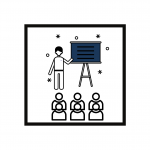



































Students should have the science subjects in their 10+2, especially mathematics and physics. This admission procedure generally consists of the following: Written Examination- The test encompasses general English, Mathematics, Physics and Reasoning (10+2 standard). Pilot Aptitude Test will assess your aptitude on Air Regulation, Air Navigation, Aviation Meteorology, Aircraft and Engine Knowledge During Personal Interview and DGCA Medical examination, the candidates succeeding in written examination and aptitude test will be required to take a medical assessment conducted by the Directorate General of Civil Aviation, Govt. of India.
To obtain a student pilot license, a student would have to appear for an entrance examination. This consists of an oral test and will be taken by the Chief Instructor at the School, or the Directorate General of Civil Aviation (DGCA) representative. This license allows one to get flying training and permits them to take off flights on gliders or small planes that are generally provided by approved flying clubs of the country. By the time one completes their course, they should have completed a minimum of 250 flying hours, following which they can apply for the Commercial Pilot License (CPL).
● Indira Gandhi Rashtriya Uran Academy (IGRUA), Rae Bareilly ● Rajiv Gandhi Academy of Aviation Technology, Kerala ● National Flying Training Institute, Gondia ● Bombay Flying Club, Mumbai ● Ahmedabad Aviation & Aeronautics Ltd., Ahmedabad ● Madhya Pradesh Flying Club (MPFC), Indore ● CAE Oxford Aviation Academy, Gondia, ● Indigo Cadet Training Program, (Hamilton, New Zealand & Hyderabad, India) {Note: Every institute has their respective specifications concerning physical fitness, and eyesight specifically}
A Commercial Pilot is a pilot who flies a specific aircraft type for an airline and holds a commercial pilot certificate issued by an authority. In India, the authority is the Directorate General of Civil Aviation (DGCA). Being a commercial pilot comes with a lot of responsibility. You will be responsible for hundreds of lives in a single aircraft, taking them from point A to point B in the fastest and the safest way possible. Many people are misinformed about what a commercial pilot is. They assume that if someone is a commercial pilot, they are an airline pilot. While it's true that an airline pilot is, indeed, a type of commercial pilot, the opposite is not always true: A commercial pilot is not necessarily an airline pilot. Commercial pilots can be cargo pilots, tour pilots, or backcountry pilots. They can be flight instructors, ferry pilots or glider tow pilots. A commercial pilot is simply one who is allowed by the FAA to charge money for services. To fly a regularly scheduled passenger service, or to fly for an airline, you'll also need to gain the additional requirements for those specific jobs. For instance, an airline pilot needs to have a commercial pilot certificate along with an Airline Transport Certificate (ATP) and must work for a regularly scheduled air carrier or some certificated operator to charge money.